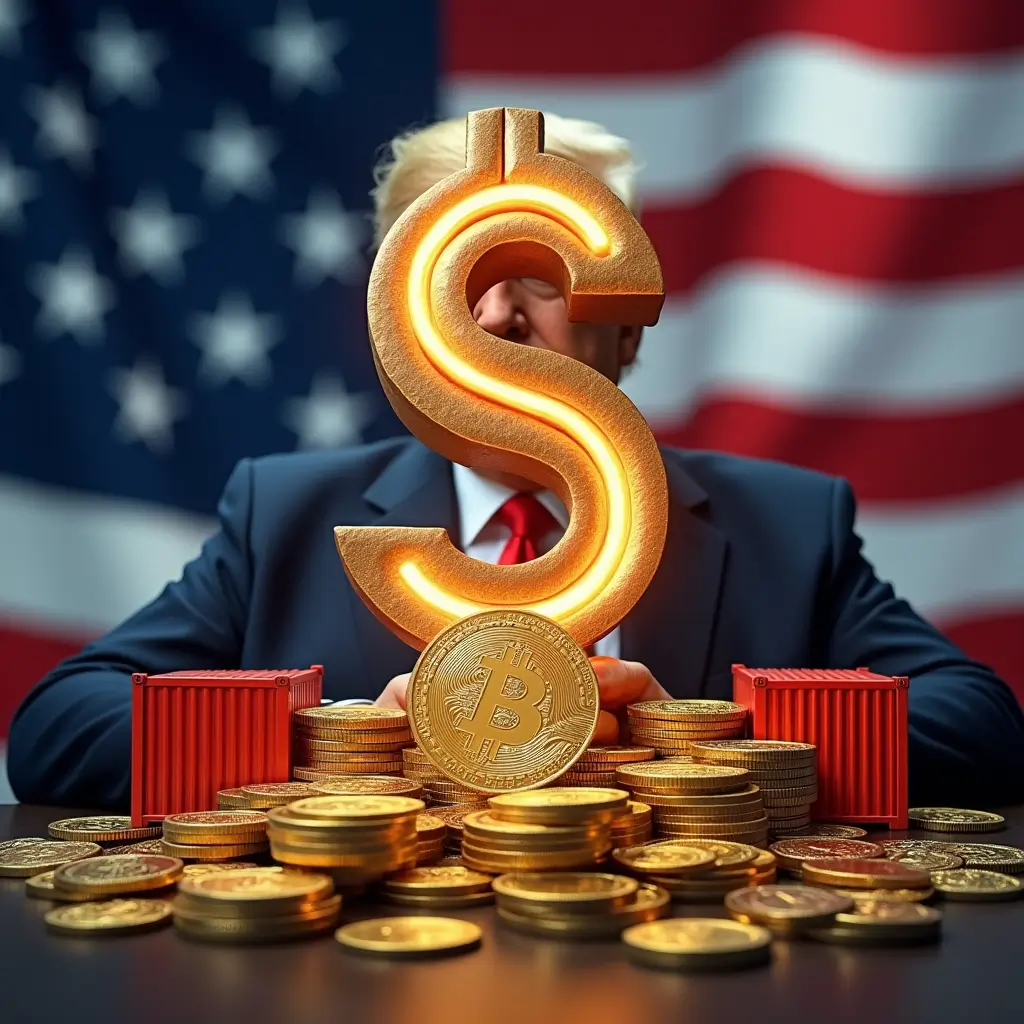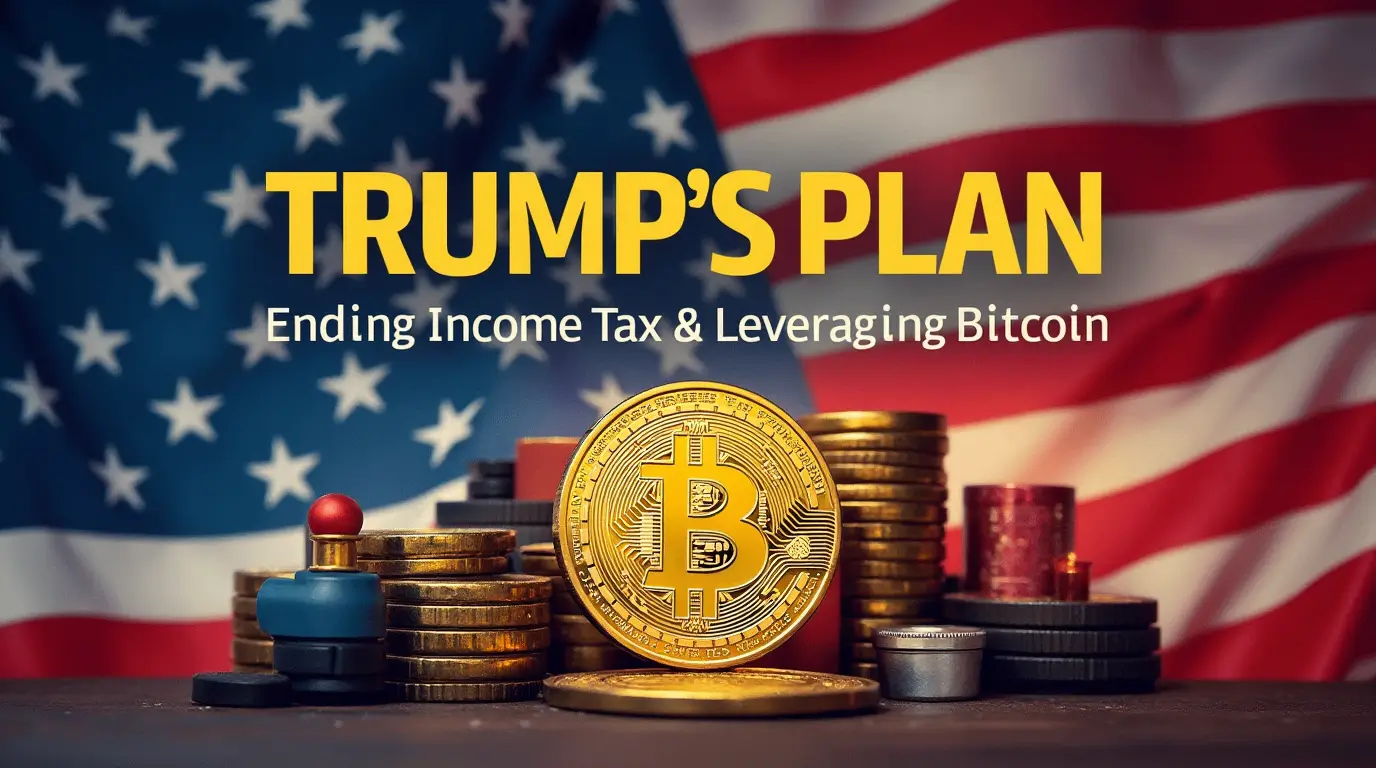Table of Contents
Imagine if you no longer had to pay federal income tax. Instead, the revenue would come from tariffs on imported goods, and Bitcoin could become a powerful tool for national debt reduction. Former President Trump has floated these groundbreaking ideas, sparking curiosity and debate. By exploring Trump’s vision to end federal income tax and implement a Bitcoin reserve, this article delves into the potential impacts, challenges, and broader implications of these proposals. If successful, such measures could redefine the way the United States funds itself and manages its massive $35 trillion national debt.
1. Trump’s Proposal to Eliminate Federal Income Tax
The Vision for a Federal Income Tax-Free America
Former President Trump recently revealed his intention to replace the federal income tax system with tariffs on imported goods. During an interview on The Joe Rogan Experience, Trump pointed to the tariff-focused policies of former President William McKinley in the 1890s. McKinley’s tariffs, Trump claims, generated more revenue than the government could even spend. Trump believes that by re-adopting this strategy, the U.S. could protect domestic industries, boost the dollar’s value, and eliminate the need for federal income taxes.
How Tariffs Would Replace Federal Income Taxes
Trump’s proposal relies on a significant shift in how the U.S. generates revenue. Currently, federal income tax contributes trillions to the national budget, funding everything from infrastructure to social programs. But under Trump’s plan, tariffs on imported goods would replace this funding stream. In theory, by applying tariffs to specific high-value import sectors—such as electronics, cars, and consumer goods—the U.S. could bring in a revenue stream comparable to income tax.
| Current Revenue Source | Revenue Generated Annually | Alternative Under Trump’s Plan |
| Federal Income Tax | $4 trillion | Tariffs on imports |
| Social Security/Medicare | $1.3 trillion | Funded by payroll tax, remains unchanged |
| Corporate Tax | $371 billion | Supplemented by tariffs if needed |
Benefits and Risks of Tariff-Based Revenue
Switching from income tax to tariffs comes with benefits and potential drawbacks:
Pros:
- Boosts domestic industries by increasing demand for locally-produced goods.
- Strengthens the dollar as fewer imports reduce foreign currency demand.
- Provides Americans with more disposable income, potentially boosting the economy.
Cons:
- Could raise prices on imported goods, indirectly costing consumers more.
- Risks trade retaliation from other countries, potentially impacting exports.
- May reduce access to affordable goods, affecting low-income households most.
While Trump argues this system would work as it did in the 1890s, critics warn that the global economy has changed, making tariffs potentially less effective today.
2. Trump’s Vision for Bitcoin as a Tool to Tackle National Debt
An Introduction to the U.S. National Debt Crisis
The national debt is currently over $35 trillion, creating enormous pressure on the government. Without a sustainable solution, this debt continues to grow, draining resources that could be allocated elsewhere. Trump has introduced a radical idea: using Bitcoin to reduce, or even eliminate, the national debt.
| Year | U.S. National Debt |
| 2010 | $13 trillion |
| 2015 | $18 trillion |
| 2020 | $27 trillion |
| 2024 | $35 trillion |
Trump’s Radical Solution: Bitcoin Reserves
Trump has suggested that Bitcoin, the world’s largest cryptocurrency, could be used as a reserve asset to help pay off U.S. debt. He explained to Fox News’ Maria Bartiromo that he envisions transferring Bitcoin to creditors as a way to “wipe away” a portion of the national debt. According to this approach, the U.S. government could accumulate Bitcoin, using it as a strategic reserve to repay creditors.
The idea of a Bitcoin reserve aligns with Trump’s past skepticism of the Federal Reserve’s monetary policy, but it brings about a new layer of complexity. Bitcoin’s value, which can fluctuate dramatically, makes it a risky but potentially lucrative option for debt management.
Challenges of Establishing a Bitcoin Reserve
Establishing a national Bitcoin reserve wouldn’t be simple. For one, Bitcoin’s volatility could make it unreliable as a reserve currency. Additionally, regulatory hurdles and resistance from traditional financial institutions could stand in the way.
Challenges:
- Volatility: Bitcoin’s price fluctuates, making it challenging for debt repayment.
- Regulation: Bureaucratic red tape could slow down any attempt to create a national Bitcoin reserve.
- International Relations: Foreign creditors may be hesitant to accept Bitcoin due to its unstable nature.
Bryan Courchesne, an asset manager, suggests that the government could start by transferring seized Bitcoin—approximately 200,000 BTC held by the Department of Justice—to the Treasury. From there, the government could explore a strategy to accumulate and use Bitcoin as a reserve.


3. Economic and Social Impact of Trump’s Proposals
How Ending Income Tax Could Affect American Households
If federal income tax were eliminated, American households would see a major financial change. For instance, without income tax, people would have more take-home pay, potentially increasing consumer spending. However, there’s also a potential downside. Tariffs, by raising the cost of imports, could make everyday items more expensive, indirectly creating a new financial burden.
Pros for Households:
- Further disposable income, which could stimulate the frugality.
- Encourages buying American-made products.
Cons for Households:
- Potential increase in prices for imported goods, affecting household budgets.
- Low-income families might struggle with higher prices on basic necessities.
Impact on U.S. Trade Relations and Global Economy
Trump’s tariff-focused approach could have a ripple effect on international trade. Imposing higher tariffs may invite retaliation from trade partners, leading to a trade war or increased tariffs on American exports. Such retaliation could make it harder for American businesses to compete internationally, which would undermine the benefits of eliminating federal income tax.
For example, if tariffs increase on goods like electronics or vehicles, the U.S. could see reduced imports, which would initially benefit domestic manufacturers. However, reduced imports might also hurt U.S. exports, creating a net loss.
Bitcoin as a Strategic Reserve: Risks and Rewards
While Bitcoin’s rising popularity among investors may make it tempting as a strategic asset, its high volatility raises questions about its stability. A Bitcoin-backed reserve would mean the government could pay off some debt during high-value peaks but face challenges during dips.
| Year | Bitcoin Price (Annual High) | Bitcoin Price (Annual Low) |
| 2020 | $29,000 | $5,000 |
| 2021 | $69,000 | $30,000 |
| 2024 | $48,000 | $16,000 |
The unpredictable nature of Bitcoin’s value could thus add risk to using it as a debt solution. To reduce exposure to these risks, the U.S. government would need to carefully manage its Bitcoin holdings, possibly setting up guidelines for selling and accumulating at strategic times.
4. Comparing Trump’s Proposals to Other Financial Reform Ideas
Trump vs. Robert F. Kennedy Jr. on Bitcoin
Trump isn’t the only political figure proposing Bitcoin as a solution to economic challenges. Robert F. Kennedy Jr., an independent candidate earlier in 2024, also suggested using Bitcoin as a strategic asset to bolster the U.S. dollar. While Kennedy aimed to support the dollar, Trump’s plan goes further, envisioning Bitcoin as a way to pay off national debt.
| Aspect | Trump | Robert F. Kennedy Jr. |
| Purpose | Debt reduction | Strengthening the dollar |
| Asset Use | Bitcoin for creditor payments | Bitcoin as a reserve asset |
| Public Reception | Controversial | Popular with crypto enthusiasts |
How Other Countries Have Managed National Debt Without Income Tax
Throughout history, some countries have relied on alternative funding strategies, such as tariffs or value-added taxes, to fund government operations. By studying these models, we can gain insight into the potential effectiveness of Trump’s proposed system. However, most examples are from smaller economies, making the transition more challenging for a country as large as the U.S.
5. The Future of U.S. Economic Policy: Could Trump’s Ideas Work?
Public and Political Reactions to Trump’s Proposals
Both political supporters and critics have voiced strong opinions on Trump’s ideas. Proponents argue that eliminating income tax could boost household finances, while others worry about the potential impact of tariffs on consumer prices and international relations. Polls show mixed responses, indicating that while some Americans are open to change, others are cautious.
Expert Opinions: Economists Weigh In
Economists are split on the practicality of Trump’s proposals. Some, like Bryan Courchesne, see the potential for a Bitcoin reserve but recognize the regulatory challenges. Others are skeptical, arguing that Bitcoin’s volatility makes it unfit as a reliable government asset. Meanwhile, trade experts warn that the impact of tariffs on U.S. exports could be damaging, particularly for industries that depend on foreign markets.
Conclusion: An Economic Future Defined by Innovation and Risk
Trump’s proposals to eliminate federal income tax and use Bitcoin for national debt management are radical, sparking both excitement and caution. These ideas, if implemented, would redefine the U.S. economy, challenging traditional systems and reshaping the way the government funds itself. Whether Trump’s vision becomes reality or remains an ambitious concept, it highlights the importance of innovation in tackling complex issues like the national debt.
In considering these proposals, remember the impact of economic policies goes beyond numbers; it affects every American’s daily life, from household budgets to international trade. Bold ideas may lead to breakthroughs, but they also carry risks. As the conversation continues, keep a close watch on developments—you might just witness a major shift in the U.S. economic landscape.
FAQs
- Could eliminating federal income tax be feasible in the U.S.? Feasibility depends on how much tariff-based revenue can match current federal income tax revenue.
- Would tariffs raise prices on everyday goods? Yes, tariffs may increase the cost of imported goods, affecting consumer prices.
- Why does Trump believe Bitcoin could help with national debt? He sees Bitcoin as a high-value asset that, if managed well, could serve as an alternative debt solution.
- Has any country eliminated income tax in favor of tariffs? Yes, historical examples exist, though most are smaller economies than the U.S.
ApexWeb3: Engage with these proposals and share your thoughts—could such ideas reshape America’s economic future?





